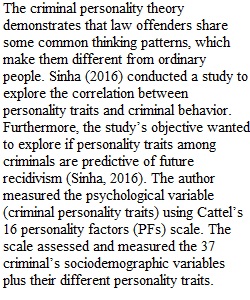


Q Each theory application essay looks at two aspects: 1) empirical testing of the theory 2) application of the theory to policy or practice in criminal justice. Part 1 Using Google Scholar or university library databases, find a recent empirical article (published within the last 10-15 years) that tests some aspect of one of the biosocial or psychological theories as applied to criminal justice issues. Use one of the theories covered in Chapters 3 and 4 of the course textbook. For example, you can use key words like "genetics and crime", "biological maturity and juvenile delinquency", "psychopathy and violence", or "mental illness and property crime" (or whatever other type of crime you are interested in with regard to its connection with mental illness). a. Copy and paste the article reference in APA format (click " button in Google Scholar or "Cite" button in library databases to obtain a reference). b. Explain how the authors measured the biosocial or psychological variable that you chose to focus on (independent variable) and what type of crimes or delinquent behavior was measured as the outcome (dependent variable). c. In a nutshell, what were the results of this study? d. What do you think the results of this study imply for the theory (or a specific component of the theory)? Part 2 Write a short (2-3 paragraphs) essay discussing which criminal justice policy or program seems most compatible with a biosocial or psychological theory of your choice and how specifically the key concepts and propositions of the theory align with or inform the main parts of the policy/program. Clearly indicate Part 1 and Part 2 of your essay! Save the file as a Word document and upload it to the TurnItIn link below. TurnItIn is a system that checks for plagiarism so make sure you don't use any phrases or sentences from other sources (except for copying and pasting the article reference in APA format). PreviousNext
View Related Questions